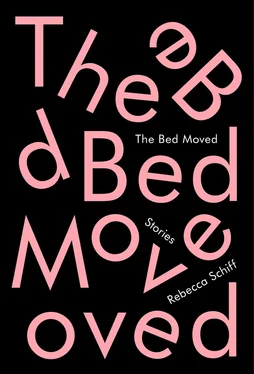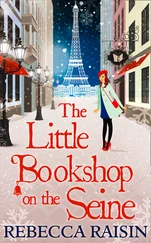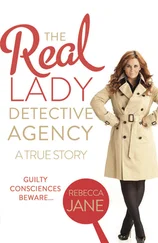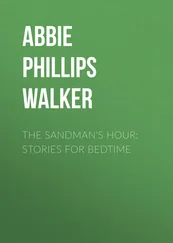“Is Isobel home?” I say.
“She cleans today,” he says.
“She’s not cleaning here today,” I say. “I can’t find my grandmother, and I thought maybe they went somewhere together. Sometimes Isobel drives her to the pool.”
“Isobel don’t have a car.”
“Right,” I say. I remember the van out front, sense he’s not its driver. “They take a taxi. From here. Isobel walks to our house and then they take a taxi to the pool. Swimming’s good exercise for old people.”
“Call the swimming pool,” he says, and hangs up.
Both my grandmother and the housekeeper are not where they’re supposed to be. They’ve escaped. I call my mother again. Her secretary says she’s left for the day due to a family emergency.
“I am her family.”
“Oh, I didn’t recognize your voice. Your grandmother, honey. She’s in stable condition, but she was struck by a car crossing the street this afternoon.”
“Shit,” I say. It’s not a flash card word, but something new I’m practicing.
“They’re at St. Joseph’s.”
I have no way to get to St. Joseph’s. Now my father calls and tells me to stay put. He says my grandmother crosses the street like a turtle. He says that she has been “banged up a bit,” but once she’s healed, it will be time for her to go home. By home, he doesn’t mean here. I tell him Isobel’s been lying about cleaning our house to have her affair. I tell him I don’t care, but I thought he should know.
“We’ll worry about that later,” he says, as though there will be a family meeting to decide what to do.
“How will Grandma get around after she goes back?” I say. “Will she still go to Weight Watchers?”
“It’s an international organization,” he says.
I call Louisa, tell her that we may have to study at her house from now on.
“I hope you like celery,” she says. “My mother doesn’t want me getting fat.”
“I like celery,” I say. I like most things. It’s something my parents have always valued about me. I look in the fridge to see what remains. Yesterday’s cake, outlined in foil. The grapes we should have eaten instead. Cheese, which people eat for breakfast, lunch, and dinner in the country where my grandmother lives. I don’t know what they eat in the housekeeper’s country or in the country of her lover. Probably cheese.
The doorbell rings. Some kids’ doorbells make a song, but my parents probably never got that far in the doorbell catalog. They keep it simple — one kid, two sedans. Vans are for moms to drive around a brood, or for lovers who have to make deliveries. But there’s no van parked out front. Through the window, I see a man who looks as afraid of me as I feel of him. Without hearing his voice, I know it’s Isobel’s husband. We’re the ones stuck waiting for everyone else to come home.
It Doesn’t Have to Be a Big Deal
THE POT GROWER WAS BROKE. I paid for everything. We went to a restaurant funded by someone else’s pot money that served only the kind of food you’d eat when you had the munchies — hamburgers wrapped in mango, zucchini pop tarts. It was hard to date a grower without money. Something had happened to his crop, something dumb. It had to do with his ex-girlfriend, an older woman who threw eggs at his car while we were eating in the munchie restaurant. When we came out, the car said “Faggot” in ChapStick and he was like, “I’m surprised she would write that. She has so many gay friends.”
The car also said “Douche bag.”
I had never really dated anyone. Sometimes I wondered if a pot grower was the place to start. A lot of his sentences began, “When I had money,” and ended with guitars I’d never heard of. We drove back to his grow house with egg dripping off the side of the car, then fucked in an Aeron chair he’d bought when he had money.
Afterward he disappeared behind a duct-taped curtain to tend the plants that would make new guitars possible. I walked around his block, which looked like suburbia as imagined by stoners who had dropped out of college. It was. They had. The college was in the center of town and the dropouts thrived around it, growing richer than if they had finished. My dropout had become an exception to this rule. The growers grew vegetables, too — rhubarb, kale. I looked for the ex-girlfriend’s house. She could be anywhere, seething with misplaced homophobia, cradling intact eggs.
The whole town smelled like pot. Why was he broke? There was weed in his freezer. There was weed in ceramic frogs on his desk. When I tried to smoke a bowl with even a tiny bit of ash in it, he would refill the bowl immediately.
“I want you to smoke fresh,” he said.
He propped up my neck with pillows when my neck hurt. He propped up my crotch with pillows to enter me at pillow-propped angles. He seemed neither faggot nor douche bag, but more like a man with a lot of pillows.
The ChapStick wouldn’t come off the windshield. The grower scrubbed and scrubbed. We were taking a road trip to a naked hot spring, but he kept pulling over at gas stations and using the squeegee on “Faggot.” I blamed his Catholicism, his upbringing. Hippies always had parents.
“It’s off, for Christ’s sake,” I said. I hoped Christ would help. In my religion, he wasn’t the son of God. “Just a man,” they told us. He was just a man.
“Roll me one,” said the grower.
“While you’re driving?”
I wasn’t from California, so a lot of this was new to me, the pot culture, the nudity without shame. I liked being stoned and naked with this man, but being sober and clothed was more challenging. We had met the previous summer, felt each other up during a sing-along, and decided through emoticon-heavy negotiations that I would fly across the country so we could spend a week together. I sent pictures of myself in a bikini, chaste for our era, but I had a thing about keeping my actual boobs a surprise. He sent pictures of himself playing mandolin in a new band, chubbier than I remembered, his hair in pigtail buns and braids, hair I was excited to overlook in order to like him.
“It doesn’t have to be a big deal” was my mantra, or what my friends gave me as a mantra, or what the culture gave us as a mantra, the culture of managing your mantras.
“You can just have fun.”
“It can just be for fun.”
“It will be really fun.”
Was it fun? I learned a lot about his recent struggles as a bluegrass musician. I learned that the bluegrass community was not as big as it was years ago, when that movie with the bluegrass sound track came out.
“It was pretty influential,” he said. “Now everything is computers.”
Former bandmates had turned to electronica, left the area, died.
“After Dano had the accident, Rob sold all his instruments and headed to Hawaii,” he said, reviving a conversation we’d already had several times at his house. I thought of it as the “I’m mad at Dano for dying in a car crash and breaking up the band but I can’t admit it so I’ll resent Rob instead” loop. I guess he thought we’d try the conversation in the car. I still had no idea how to respond, except to say it was a shame to lose someone so young. Then he said his new band had stronger musicians anyway and put on their CD. The new band sounded just like the old band. All bluegrass sounded the same to me.
“None of us knew if Turkey Flower would stay together, but for Rob to just go…” The grower looked at the road, baked out of his mind, trying to understand.
I could have probed the Dano anger, but I didn’t want to talk about Dano either. I had enough of my own grief. I couldn’t make room for a twenty-four-year-old grower who had bashed his van into a traffic median. Dano had played everything I asked for at the sing-along. He had been cheating on his girlfriend, who was now his widow. Rob had gone to bed early the night we all sang together, resting up for his big betrayal.
Читать дальше












